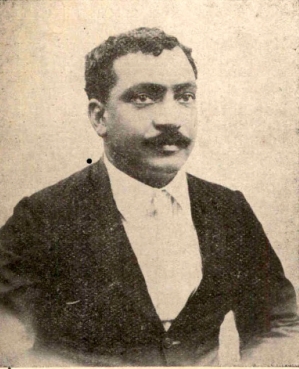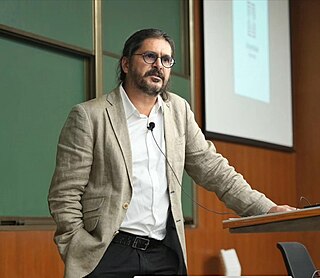Related Research Articles

Roger Bacon, also known by the scholastic accolade Doctor Mirabilis, was a medieval English philosopher and Franciscan friar who placed considerable emphasis on the study of nature through empiricism.

Brihaspati, is a Hindu god. In the ancient Vedic scriptures of Hinduism, Brihaspati is a deity associated with fire, and the word also refers to a god who counsels the devas and devis. In some later texts, the word refers to the largest planet of the solar system, Jupiter, and the deity is associated with the planet as a Navagraha.
Eastern philosophy or Asian philosophy includes the various philosophies that originated in East and South Asia, including Chinese philosophy, Japanese philosophy, Korean philosophy, and Vietnamese philosophy; which are dominant in East Asia, and Indian philosophy, which are dominant in South Asia, Southeast Asia, Tibet, and Mongolia.

Abu Rayhan Muhammad ibn Ahmad al-Biruni, known as al-Biruni, was a Khwarazmian Iranian scholar and polymath during the Islamic Golden Age. He has been called variously "Father of Comparative Religion", "Father of modern geodesy", Founder of Indology and the first anthropologist.

Buddhaghosa was a 5th-century Indian Theravada Buddhist commentator, translator and philosopher. He worked in the Great Monastery (Mahāvihāra) at Anurādhapura, Sri Lanka and saw himself as being part of the Vibhajjavāda school and in the lineage of the Sinhalese Mahāvihāra.
Vaisheshika is one of the six schools of Hindu philosophy from ancient India. In its early stages, the Vaiśeṣika was an independent philosophy with its own metaphysics, epistemology, logic, ethics, and soteriology. Over time, the Vaiśeṣika system became similar in its philosophical procedures, ethical conclusions and soteriology to the Nyāya school of Hinduism, but retained its difference in epistemology and metaphysics.
Hindu texts or Hindu scriptures are manuscripts and voluminous historical literature which are related to any of the diverse traditions within Hinduism. Some of the major Hindu texts include the Vedas, the Upanishads, and the Itihasa. Scholars hesitate in defining the term "Hindu scriptures" given the diverse nature of Hinduism, but many list the Agamas as Hindu scriptures, and Dominic Goodall includes Bhagavata Purana and Yajnavalkya Smriti in the list of Hindu scriptures as well.

The Cambridge Platonists were an influential group of Platonist philosophers and Christian theologians at the University of Cambridge that existed during the 17th century. The leading figures were Ralph Cudworth and Henry More.
Richard Henry Popkin was an American academic philosopher who specialized in the history of enlightenment philosophy and early modern anti-dogmatism. His 1960 work The History of Scepticism from Erasmus to Descartes introduced one previously unrecognized influence on Western thought in the seventeenth century, the Pyrrhonian Scepticism of Sextus Empiricus. Popkin also was an internationally acclaimed scholar on Christian millenarianism and Jewish messianism.
The development of Indian logic dates back to the anviksiki of Medhatithi Gautama ; the Sanskrit grammar rules of Pāṇini ; the Vaisheshika school's analysis of atomism ; the analysis of inference by Gotama, founder of the Nyaya school of Hindu philosophy; and the tetralemma of Nagarjuna.

Bimal Krishna Matilal was an eminent philosopher whose writings presented the Indian philosophical tradition as a comprehensive system of logic incorporating most issues addressed by themes in Western philosophy. Born in Calcutta, he lived and worked in Calcutta, Harvard, Toronto and Oxford. From 1977 to 1991, he served as the Spalding Professor of Eastern Religion and Ethics at the University of Oxford.

The Surya Siddhanta is a Sanskrit treatise in Indian astronomy dated to 4th to 5th century, in fourteen chapters. The Surya Siddhanta describes rules to calculate the motions of various planets and the moon relative to various constellations, diameters of various planets, and calculates the orbits of various astronomical bodies. The text is known from a 15th-century CE palm-leaf manuscript, and several newer manuscripts. It was composed or revised probably c. 800 CE from an earlier text also called the Surya Siddhanta. The Surya Siddhanta text is composed of verses made up of two lines, each broken into two halves, or pãds, of eight syllables each.

Babylonian astronomy was the study or recording of celestial objects during the early history of Mesopotamia. The numeral system used, sexagesimal, was based on sixty, as opposed to ten in the modern decimal system. This system simplified the calculating and recording of unusually great and small numbers.

Philosophy is a systematic study of general and fundamental questions concerning topics like existence, reason, knowledge, value, mind, and language. It is a rational and critical inquiry that reflects on its own methods and assumptions.

European science in the Middle Ages comprised the study of nature, mathematics and natural philosophy in medieval Europe. Following the fall of the Western Roman Empire and the decline in knowledge of Greek, Christian Western Europe was cut off from an important source of ancient learning. Although a range of Christian clerics and scholars from Isidore and Bede to Jean Buridan and Nicole Oresme maintained the spirit of rational inquiry, Western Europe would see a period of scientific decline during the Early Middle Ages. However, by the time of the High Middle Ages, the region had rallied and was on its way to once more taking the lead in scientific discovery. Scholarship and scientific discoveries of the Late Middle Ages laid the groundwork for the Scientific Revolution of the Early Modern Period.
This is a timeline of philosophy in the 17th century.
This is a timeline of the 18th century in philosophy

Anukul Chandra Mukerji (1888–1968) was an Indian academic, thinker, writer and a professor of philosophy at Allahabad University. He was known for his studies on the philosophy of European thinkers such as Immanuel Kant and Georg Wilhelm Friedrich Hegel, psychologists like William James, John B. Watson, and James Ward as well as the Advaita Vedanta of Adi Shankara. He was the author two notable books, Self, Thought, and Reality and The Nature of Self, and several articles and is known to have employed western methodology and language styles in his academic pursuit. The Government of India awarded him the third highest civilian honour of the Padma Bhushan, in 1964, for his contributions to education and literature.
Peter Scott Adamson is an American philosopher and intellectual historian. He holds two academic positions: professor of philosophy in late antiquity and in the Islamic world at the Ludwig Maximilian University of Munich; and professor of ancient and medieval philosophy at King's College London.

Jonardon Ganeri, FBA, is a philosopher, specialising in philosophy of mind and in South Asian and Buddhist philosophical traditions. He holds the Bimal Matilal Distinguished Professorship in Philosophy at the University of Toronto. He was Global Network Professor in the College of Arts and Science, New York University, previously having taught at several universities in Britain. Ganeri graduated from Churchill College, Cambridge, with his undergraduate degree in mathematics, before completing a DPhil in philosophy at University and Wolfson Colleges, Oxford. He has published eight monographs, and is the editor of the Oxford Handbook of Indian Philosophy. He is on the editorial board of the Stanford Encyclopedia of Philosophy, the British Journal for the History of Philosophy, Philosophy East & West, Analysis, and other journals and monograph series. His research interests are in consciousness, self, attention, the epistemology of inquiry, the idea of philosophy as a practice and its relationship with literature. He works on the history of ideas in early modern South Asia, intellectual affinities between India and Greece, and Buddhist philosophy of mind, teaches courses in the philosophy of mind, the nature of subjectivity, Buddhist philosophy, the history of Indian philosophical traditions, and supervises graduate students on South Asian philosophical texts in a cross-cultural context. He is a prominent advocate for an expanded role for cross-cultural methodologies in philosophical research, and for enhanced cultural diversity in the philosophical curriculum. Jonardon Ganeri is the inventor of the idea of "cosmopolitan philosophy" as a new discipline within philosophy.